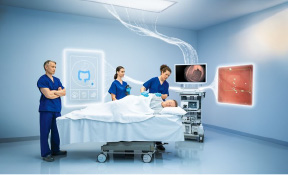Olympus Launches the OLYSENSE™ Platform with CADe/AI Solution in the U.S.
CADDIE™ software helps clinicians detect suspected colorectal polyps to improve care pathways.

The CADDIE™ medical device software is the first of the OLYSENSE™ CAD/AI applications to be launched in the US, with a specific focus on aiding in the detection of high-risk and hard-to-detect colorectal lesions during colonoscopies.
CENTER VALLEY, Pa., (September 30, 2025) – Olympus Corporation of the Americas (Olympus) today announced the U.S. commercial launch of the OLYSENSE™ Platform with CADDIE™ medical device software, its first computer-aided detection (CADe) solution powered by artificial intelligence (AI). The cloud-based CADDIE software uses AI to support early colorectal polyp detection, enhance clinical outcomes, and improve patient care.
With more patients needing endoscopic evaluation due to demographic trends, demand for procedures continues to rise. Yet gastroenterologists must manage heightened workloads, administrative burdens, budget constraints, and staff shortages. AI-based and data-driven solutions offer opportunities to address these demands, supporting efficient screening and early detection and helping care teams focus on appropriate treatment and, potentially, better outcomes.
“With the OLYSENSE platform, we are taking a meaningful step forward in helping patients receive early, accurate diagnoses,” said Keith Boettiger, Corporate Officer, Head of Gastrointestinal Solutions Division, Olympus Corporation. “Our goal is simple: to give clinicians the advanced tools that make it easy to find and assess challenging lesions early, make confident, informed decisions, and provide their patients with the best possible care.”
Intelligent support for clinicians leads to tangible enhancements
The CADDIE™ software aids in the detection of high-risk and hard-to-find lesions. Trained on a robust dataset, CADDIE software analyzes colonoscopy video frames to help identify lesions, including high-risk types such as large polyps and hard-to-detect ones like sessile serrated lesions (SSLs).i
A multi-center randomized controlled clinical trial conducted across eight European hospitals demonstrated the potential impact of the technology on the prevention and early detection of colorectal cancer. When the CADDIE software was used with patients indicated for screening and surveillance as opposed to when it was not utilized, this trial found relative increases in detection of the following lesion types per colonoscopy:i
- 136% relative increase in large (>10mm) polyps
- 93% relative increase in large (>10mm) adenomas
- 57% relative increase in flat adenomas
- 230% relative increase in SSL
“Cloud-based and AI-powered endoscopy solutions are transforming clinical practice. By enabling real-time decision support and standardized assessments, they help clinicians diagnose earlier and more accurately, streamline workflows, and improve patient outcomes,” said Professor Cesare Hassan, M.D., Ph.D., a gastroenterologist from Humanitas University, Pieve Emanuele, Milan, Italy. “Endoscopy on the cloud opens the door for continuous innovation and broader access to advanced care.”
The CADDIE™ software integrates with the Olympus EVIS X1™ endoscopy system and EVIS EXERA™ III endoscopy system for smooth adoption into clinical practice. Clinicians also gain immediate access to the latest software updates via the cloud.
Through the OLYSENSE™ platform, Olympus aims to integrate clinical and operational solutions, providing data connectivity across the GI unit and integration with hospital systems, creating an intelligent endoscopy ecosystem.
As part of its long-term vision, Olympus is committed to expanding the OLYSENSE platform so that each new capability meets the evolving needs of clinicians worldwide.
To find out more about OLYSENSE, join us at Olympus Booth #1038 at the American College of Gastroenterology meeting in Phoenix, Arizona, on October 26-28, 2025, or visit the Olympus OLYSENSE™ Platform with CADDIE™ software webpage for more information.
# # #
Fair/Balance Statements and Disclaimers
The gastroenterologist is responsible for reviewing CADDIE suspected polyp areas and confirming the presence or absence of a polyp based on their own medical judgment.
The CADDIE computer-assisted detection device is not intended to replace a full patient evaluation, nor is it intended to be relied upon to make a primary interpretation of endoscopic procedures, medical diagnoses, or recommendations of treatment/course of action for patients. The CADDIE device is limited for use with standard white-light endoscopy imaging only.
Professor Cesare Hassan served as an investigator in the referenced multicenter clinical study.
About Olympus Corporation of the Americas
At Olympus, we are committed to Our Purpose of making people’s lives healthier, safer and more fulfilling. As a global medical technology company, we partner with healthcare professionals to provide solutions and services for early detection, diagnosis and minimally invasive treatment, aiming to improve patient outcomes by elevating the standard of care in targeted disease states.
Olympus Corporation of the Americas, a wholly owned subsidiary of Olympus Corporation, is headquartered in Center Valley, Pennsylvania, USA, and employs more than 4,500 employees throughout locations in North and South America. For more information, visit olympusamerica.com.
i Data not peer-reviewed/published at time of document creation; Prospective randomized controlled multicenter trial sponsored by Odin Medical Ltd., a subsidiary of Olympus Corporation; Data on file with Odin Medical Ltd, EAGLE Trial - NCT05730192


































